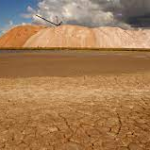 U.S. sanctions against the Belarusian potash industry, which have helped push fertilizer prices to record levels, could push President Alexander Lukashenko further into the arms of Russia.
U.S. sanctions against the Belarusian potash industry, which have helped push fertilizer prices to record levels, could push President Alexander Lukashenko further into the arms of Russia.
While Lukashenko has not yet asked Russia for support, the Kremlin expects the Belarusian leader to reach out for help with budget deficits caused by the ban on potash sales.
Potassium is the only abundant natural resource in Belarus, and international sales account for more than 7 percent of the country’s export income. After the United States sanctioned state potash producer Belaruskali OAO, Lithuania reported last week that it would halt shipments of the fertilizer as of Feb. 1, closing a route used for nearly all of its exports.
Belarus controls about one-fifth of the global potash market, along with other major producers including Russia and Canada.
While benchmark fertilizer prices in many regions, such as China and India, are derived from annual agreements between producers and buyers, there are spot sales in other key markets such as Brazil.
The Belarusian leader has faced mounting pressure from the United States and the European Union for his brutal crackdown on widespread protests after the disputed 2020 presidential election. Putin has stood by his ally and sought to capitalize on the crisis by pressing Lukashenko to accelerate economic and political integration between Russia and Belarus, which are in a so-called Union state.
U.S. sanctions against Belaruskali went into effect on December 8. These sanctions are another argument for Lukashenko to receive support, benefits and money from Russia.
The sanctions begin to sting just as Belarus and Russia hold joint military exercises on the border with North Atlantic Treaty Organization countries next month, amid rising tensions with the West over Ukraine. The U.S. and Europe say a massive buildup of Russian forces near the border with Ukraine may be preparation for an invasion, something the Kremlin denies.
“Belarus is our partner. We are not abandoning it and we will not abandon it,” Putin spokesman Dmitry Peskov told reporters last week, in response to a question about Lithuania’s decision to halt potash transit.
Belarus will likely try to beat sanctions by redirecting potash sales through Russia as the only possible channel for exports. Russia may offer to buy supplies at below-market prices and resell them as Russian potash or consume Belarusian potash in its market while exporting more of its own production.
.gif) Loading
Loading


